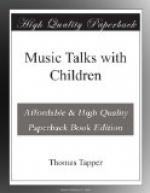I. To keep to it and not be drawn away by another part.
II. To give the part we sing its due prominence.
III. Never to destroy the perfect
equality of the parts by unduly
hastening
or holding back.
IV. To remember that each part
is important. The other singers have
as much
to think of and to do as we have, and they are entitled
to just
as much praise.
V. To be alert to take up our part at exactly the right place.
VI. To put the full meaning
of the poet and of the composer into
every word
and tone.
These, after all, are only a few of the things; but from them we may learn this, that to sing (and to play is quite the same) is one of the most delicate tasks we can learn to perform, requiring attention from us in many ways at the same time. Even now the usefulness of music is clear, for the faculties we learn to employ in music form a power that can be applied in anything.
But music has even a greater reward for us than this. It presents to us many kinds of thoughts and pictures,—of bravery, of thoughtfulness, of gaiety, and others without number—and then it demands that we shall study so as to sing them truthfully from our hearts. And when we can do this music is then a joy to us and to others.
Now we see that music, just like the other studies, is useful and gives us the power to do something. And besides its use and power it is, perhaps more than any other study, the greatest means of giving happiness to others. But of that there is yet a word to be said. That shall be our next Talk.
CHAPTER XXIV.
HOW ONE THING HELPS ANOTHER.
“Music washes away from the soul
the dust of everyday
life.”—Berthold Auerbach.
Just at the end of our Talk about Music in School, I said that music was the most powerful of all the studies for giving joy to others. In this Talk we shall try to learn what the studies do for each other.
Once more—and we must never get tired if the same thought comes again and again—let us remember that music is thought expressed in tone. Classic music is great and strong thought; poor, unworthy music is weak, perhaps wrong or mean thought.
Further, we have learned that thought may be good and pure, and yet that of itself is not sufficient. It must be well expressed. In short, to thought of the right sort we must add knowledge, so that it may be set before others in the right way.
Now, it is true that the more knowledge we have, the more we can do with music. We can put more meaning into it; we can better perform all the exacting duties it demands; we can draw more meaning from its art, and we can see more clearly how great a genius the composer is. Besides these things, a well-trained mind gets more thoughts from a subject than an untrained mind. Some day you will see this more clearly by observing how much better you will be able to understand your own language by possessing a knowledge of Greek and Latin.




